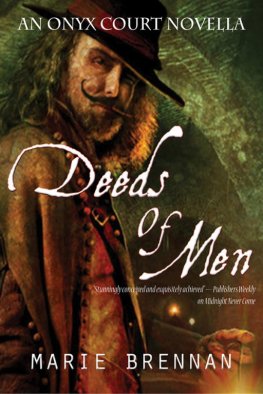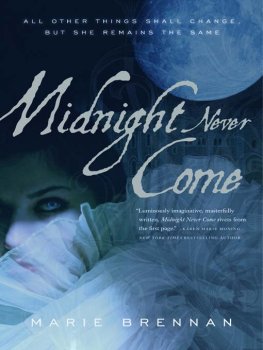Marie Brennan
DEEDS OF MEN
AN ONYX COURT NOVELLA
O, act, most worthy hell, and lasting night,
To hide it from the world!
V.viii.389-90
Red Cross Alley, London: 2 June, 1625
They found him in a narrow alley, within smelling distance of the riverside wharves and the pestilential tenements that crowded them, with his throat slit from ear to ear.
Sir Michael Deven knelt in the muck, not caring that he ruined the knee of his breeches, and bit down hard on a knuckle to hold back tears.
The long, gangly limbs sprawled without grace, like a childs doll thrown aside. Even in the poor light, occluded by the overhanging jetties of the buildings on either side, the rich green taffeta of his doublet gleamed incongruously bright, a spot of elegance and wealth in a place that knew neither. Deven noted these details with fierce determination, trying not to acknowledge the bloodless face, the staring eyes, out of which the dreams had gone forever.
For the first time in over six decades of life, he felt old. Because this is what age is. Not the weakening of the body, nor the dimming of the mind, but your hopes lying shattered at your feet.
He forced down the hard knot in his throat and took the knuckle from between his teeth. Truncated strings dangled from the belt, where a purse should have hung. Murdered, by a common thief.
Beggin yer pardon, milord, but I dont think so.
The diffident voice was not one he wanted to hear, not when its owner had come to tell him a young man lay dead in a Coldharbour alley. But he made himself look as Mungle sidled forward. The fellow appeared to be a dockside labourer, one of the rough cobs who unloaded goods from ships into Londons voracious maw. A mask, of course, but he wore it well.
Mungle went toward the body, with hesitant steps that gave Deven time to call him back. Grimacing, he bent and rolled the head the other way, so the clouded eyes no longer stared in accusation. Mud caked the left ear, but something still hung from its lobe. Earrings here, Mungle said. And shoes. And that belt. Worth more than a hapenny, those would be; any slower getting here, and youd find them gone. A thief worth his cut would take them.
Perhaps the thief was interrupted.
In Coldharbour? Mungle laughed, then swallowed it guiltily. Whod bother? Id guess they took the purse to make it seem ordinary. But they was no thieves. And look Mungle lifted one pallid, unresisting hand, stained with blood from a small wound. Rapier, Id say. Nicked him on the sword hand. He was fighting somebodya gentleman.
Deven stood, moving carefully against the growing sickness in his gut. Mungle was right. This wasnt simply an unfortunate encounter with a cutpurse. The murderer had a reason beyond gold, and Deven knew of only one great enough to suffice.
Henry Wares death was a consequence of the world Deven had brought him into.
Which was, in a way, good news. Because whichever faerie had murdered him, Deven could and would see the creature responsible hanged.

To shine
Bright, as the Moone, among the lesser lights,
And share the sovraigntie of all the world.
II.i.35-7
The Onyx Hall, London: 21 January, 1621
Bright laughter danced among the leaves and flowers of the night garden, blooming in a perpetual spring beneath a sky of stone. The buried waters of the Walbrook sang counterpoint as the elegant lords and ladies of the Onyx Court ran down the paths, playing some game whose rules Deven could not discern. But the faeries paused in their flight, bowing or curtsying out of his path with a friendly murmur of my lord, before resuming their pursuit.
Lune was not among them. He found her seated in a quiet corner, beneath the satin-soft petals of an apple tree, attended only by Amadea, the elf-lady appointed chamberlain of the court. Upon seeing Deven, Lune smiled and gestured the lady away, making room for him on the cushion at her side. Welcome home, my heart.
He had been gone only a few daysa customary absence, to protect himself against the dangers of time spent among the fae. Still, her words were apt; his return always felt like a homecoming. If not to the Onyx Hall, then to her.
They were not so hidden as to be private, so Deven contented himself with a kiss upon her ungloved hand, her skin cool against his lips. Nonetheless, he heard a mischievous giggle from the underbrush of the garden. The fae were hardly puritanical in their behaviour, but they still found delicious scandal in the decision of their Queen to take a mortal consort. Dalliance was one thing; many of them indulged in it from time to time. But love? The emotionnot what the Queen did in her bedchamberwas shocking, even after all these years.
Certainly Devens own fellows would be appalled, if they knew he remained a bachelor for love of a faerie Queen.
Already they said too much about him. A man might live fifty-eight years and no one would remark on it. But to live fifty-eight years and show scant sign of ithis health was unflagging, his hair untouched by grey. When in public, he took care to move slowly and stiffly, as if his joints pained him in the damp. That pretence, however, could not hide the smoothness of his face, where time ought to have carved lines marking the passage of his mortal span. Men noticed, though they did not know the cause.
Lune said, You are brooding on something.
She spoke the words lightly, chiding him for bringing heavy thoughts into her garden diversion. She might have been the subject of a pagan fresco, there beneath the flowering apple tree, with her moon-bright hair loose like a maidens, and the sight of her gave his heart a sudden pang. As little as he had changed, she changed even less: only the style of her hair and gown, idly following in the wake of mortal fashion as it pleased her. Time would never touch her facenor would death.
Her silver gaze sharpened. What troubles you?
Deven bent his head, playing idly with her long, delicate fingers. He accepted the impossibility of hiding the evidence of his thoughts from her, but that did not mean he must share their substance. Nothing you wish me to speak of, he told her.
But the words were ill-chosen; he might as well have hung out a sign. Lunes face stilled, and she drew her hand from his. It shivered there between them: mortality.
She could shelter him from it, a little. The faerie touch he bore, the legacy of a cup of wine, slowed his aging. Every moment he spent in a faerie realm was a moment in which time stopped. But to stay among them forever would shatter his mind, and so instead he walked between the two worlds, mortal and fae.
And in time, the mortal side must win.
That day, she said, lies far off yet.
May it be so, Deven said, long habit suppressing the more common invocation of God. They would not thank him for that, here in the heart of the Onyx Hall. But Lunewe must speak of what will come.
Why? It came out angry, but he understood. Twill come when it comes, and when it does, my heart will break. Then you will be gone, and I will live on in grief. What is there to speak of?
The Onyx Court, he said.
It quieted the trembling of her shoulders, armoured in their midnight silk. Lune had never studied for sovereignty, not as a prince might. Then again, neither had old Queen Elizabeth. But both women shared a quality that stood them in good stead where no number of books and tutors would: they both held an unwavering commitment to the stability of their realmsthough Elizabeth had refused to wed and bear an heir.
Lunes heir was not in question; immortal creatures need not concern themselves with such things. Deven, however, was another matter.













